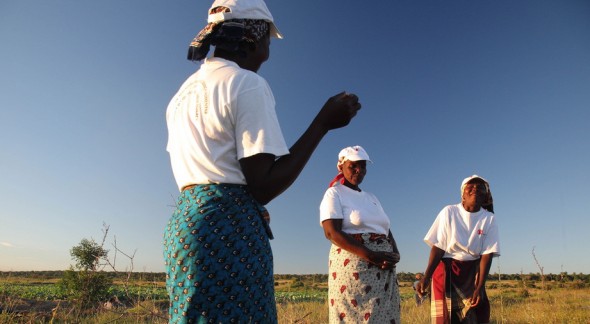TakePart | June 3, 2014

Sweet potato farmers in Mozambique. Photo by International Livestock Research Institute courtesy Creative Commons
For farmers in Mozambique, every harvest is bittersweet. That’s because up to 40 percent of their crops can spoil, as there’s no way to keep them cool. It’s a common and costly problem in countries that lack reliable power grids—or have no access to electricity at all—and that can ill afford to throw away food.
Farmers can use diesel generators to refrigerate produce, but they’re expensive and cause pollution. What if they could tap carbon-free solar energy to power a device that chills newly harvested crops, thus extending their shelf life? Better yet, that device could be manufactured locally, creating jobs.
Rebound Technology of Boulder, Colo., is trying to do just that. Formed by two solar industry exiles, the start-up is developing a 3-D-printed heat exchanger and a membrane made from a Gore-Tex-like material that uses solar thermal heat to create refrigeration.
“If we can cool the products in the field, then that will be really beneficial. In Mozambique, crops are being harvested in 77 to 86 degrees Fahrenheit,” said Kevin Davis, Rebound’s cofounder and CEO. “By lowering the temp of that product you’re stunting some of the metabolic processes that lead to spoilage.”
Higher-quality produce could be sold for up to four times more than the price of fruits and vegetables that have not been chilled before being transported to market, Davis says. Because women are buying the food from farmers to sell at the markets in Mozambique, it would also help women small business owners, according to Koos Van Der Merwe, the co-owner of Mozambique Organicos, a farm that is partnering with Rebound to field-test the technology next year.
Here’s how it works: Salt is dissolved in warm water running through a 3-D-printed heat exchanger. The saltwater solution absorbs the heat from the warm water, which makes it colder. That dip in temperature chills another pool of water that the farmers dunk their produce into after harvesting. To ready the process for the next day, a membrane placed into the saltwater uses heat generated by a solar thermal panel to separate out the salt and water across the membrane.
As simple as it sounds, Rebound’s product—dubbed SunChill—has some way to go before it can be deployed to Mozambique farmers. With $1.4 million in funding from the U.S. Agency for International Development—via “Powering Agriculture,” a new program aimed at fostering clean-tech solutions to boost agricultural productivity in developing countries—Davis and cofounder Russell Muren will spend the better part of the next year designing and testing the SunChill prototype.
The pair will meet with smallholder farmers in Mozambique this month to gather information for the design process. They’re also working with German collaborators to finalize the membrane’s design.
One challenge the company is still working out, Davis says, is the best way to get SunChill into the hands of small farmers, given the system’s expected $6,000 price tag. Rebound thinks it’s feasible for larger operations such as Mozambique Organicos or agricultural co-ops to purchase the equipment for use by a large group of farmers.
Van Der Merwe, who is about to start a business working with small farmers, says SunChill can fill a void. “I’m quickly running out of capacity to accommodate all small-scale production,” he says. “Being [that we supply] mostly produce for the local markets, we’re hoping that the SunChill technology can provide the answer to this need.”
View the original story here.